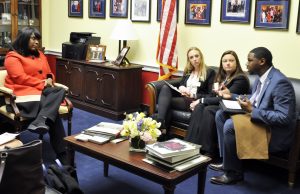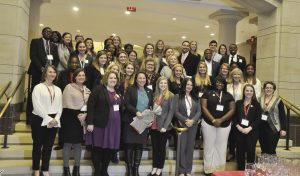
University of Alabama social work students have returned from Washington, D.C., fulfilled and accomplished.
On March 21, shortly after students spoke with lawmakers, the U.S. Senate passed the “Allow States and Victims to Fight Online Sex Trafficking Act,” a bill previously approved by the U.S. House of Representatives, which would give state attorneys general the ability to prosecute owners of websites that enable sex trafficking. In response to the Senate vote, Craigslist shut down the section of its website that allows individuals to seek encounters with strangers.
“We’re already seeing how what we were doing – a class assignment – really affects a lot of people,” said Shelby Smithson, a master of social work student from Mobile. “This law is going to have so much power and prevent terrible things from happening.”
Forty-eight UA, University of Alabama at Birmingham and University of Alabama at Huntsville undergraduate and graduate students and 20 students from Ohio State University took part in the “Washington, D.C. Policy and Advocacy Fly-In,” a unique crash course in policy research, strategy and advocacy created in 2017. The students met with 40 federal legislators in the nation’s capital March 20-21 to explain how proposed legislation would improve the lives of foster youth, human-trafficking victims and people struggling with opioid addictions.
In addition to meeting with members of Congress, students learned from approximately 15 speakers, including experts from policy and advocacy agencies, and trained intensively for the presentations they made.
Many of the lawmakers expressed interest in sponsoring or voting for bills the students advocated for, or introducing companion legislation in their houses of Congress.

Smithson said the experience taught her change can come from the grass-roots level, that members of Congress want to hear from the community, and that social workers can serve as a vital bridge between policymakers and people who don’t feel like they have a voice.
Rep. Martha Roby, R-Ala., supported this claim when she told students their work is making a difference.
“I want you to know how important it is for people in your profession to advocate with elected officials,” Roby said. “We don’t know what we don’t know. If something is concerning to a constituent of mine, I want someone to tell me.”
Students completing internships during the spring semester prepare fact sheets about each bill and help train fly-in students once they arrive in Washington. When making cases before lawmakers, students use both personal stories and statistics.
Students also advocated for three other bills:
- HR 2512: Foster Youth and Driving Act
- S 1795/HR 3740: Fostering Success in Higher Education Act of 2017
- HR 2938: The Road to Recovery Act
“I thought it was going to be so uncomfortable, and it wasn’t,” said Kaleb Crabtree, a senior from Scottsboro who promoted the Foster Youth and Driving Act. “It was almost like a conversation, with questions and answers. Afterward, I knew I had done my part to push this important bill through. I honestly felt like a change-maker and a social worker.”
